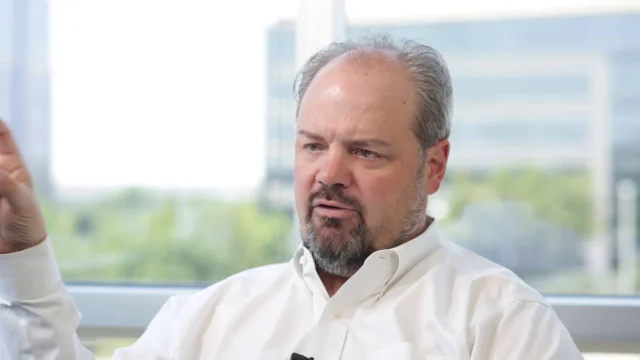The following discussion focuses on the migration to Corepoint Integration Engine and the overall impact of an engine on patient care.
On a visit to Cedar Rapids, Iowa, Corepoint Health Founder and CTO, Dave Shaver sat down to interview Joe Hamilton, UnityPoint Health’s Technical Team Lead – Interoperability. Their conversation covered a variety of topics ranging from operating system performance, integration engine evolution, the growth and change of the healthcare industry, and ways in which engines and engine teams can impact patient care.
Topic: A more productive team
Topic: Building and supporting interfaces
Topic: Impact of an integration engine on patient care
Interview Highlights
Dave: ![]() It’s about patient experience. It’s about quality of care. It’s about the speed at which you can deliver services so that’s convenience for both the care providers as well as the patient. Talk a little bit about how you’ve landed on Corepoint as your integration engine and maybe share a little bit of the history or the story about how that came to be.
It’s about patient experience. It’s about quality of care. It’s about the speed at which you can deliver services so that’s convenience for both the care providers as well as the patient. Talk a little bit about how you’ve landed on Corepoint as your integration engine and maybe share a little bit of the history or the story about how that came to be.
Joe: Absolutely. Number one thing everybody should think about is, “If I have to go to a UnityPoint health facility, what experience would I want to have?” And if we all go into our jobs thinking about that, then it will make a much better experience for the patient, and the patient will want to come back.
In IT a lot of times you don’t think about, “How does it affect the patient?” Right? “I’m working on a server,” or, “I’m working on a computer. What does that have to do with the patient?” Well, in the end, what you’re doing, and specifically on the interface team, a lot of the things that get moved are patient orders or patient results.
The team at Corepoint did a really good job of working with us to say, “Okay, if you set it up like this, you can have some automatic failover, and you can have a disaster recovery plan and all of these other things to go with it.” They tell you to set it up like that and it’s going to work. It actually does. I know I shouldn’t be surprised, because vendors say that all the time, but it’s surprising that if you set it up like that, it works!
Beyond the Video
- Putting yourself in the patient’s shoes
- How the integration team enables interoperability for patients
Dave: Most hospitals have mission statements, have directions, some are faith oriented, some of them are outreach oriented. Give some sense of how the mission of your organization carries to the IT organization and then spreads specifically to your team.
Joe: That’s a very interesting one, because we really want to focus on the patient, and we’ve always had a patient-centered focus. The goal of UnityPoint is to be the premium healthcare provider of the Midwest, because that’s where we are. As part of that, in IT you often don’t think about, “How does it affect the patient?” Right? “I’m working on a server,” or, “I’m working on a computer. What does that have to do with the patient?” Well, in the end, what you’re doing, and specifically on the interface team, a lot of the things that get moved are patient orders or patient results.
If you think about it… Put yourself in the shoes of the patient. You’re walking into a hospital, you’re walking into a lab, and you’re checking in. Maybe you check in at the front desk of the hospital, and they gather all this information from you. Then you have to go down to lab to get some blood drawn, and wow, they have to collect all that information again. Why can’t you just use the information I just gave the person up front? Well, that’s what the interface team does. We provide that connection between the systems so that the lab folks don’t have to ask for all that information again. You’re saving the patient so much time by allowing them to have that information at their fingertips. Most importantly, patients just get better served.


